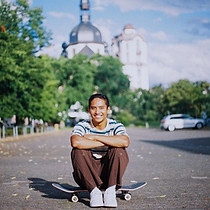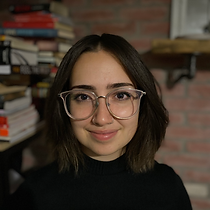Who We Are

Hello, I am Louie! As a child, I was always keen on the environment and the issues permeating its geographical presence - this developed into a passion well into my adulthood which I am hoping to share with you.
Here's a brief backstory about myself: Throughout high school, I've had opportunities to lead and amplify youth development and agency by teaching grade eight physical education classes, redesigning and refurbishing my community playground, and mentoring international students. I look forward to meeting you and being a part of a cause relatable to everyone. Let's take this journey together as we explore and learn about the environment. We hope you get involved to have your say in the global discussion of environmental issues and use this space as a creative outlet to engage with peers, create, and publish a meaningful representation of yourself and your environmental awareness.

Hey, I'm Jess! I have always been interested in crafting and I love working with a team, so I'm super excited about this project!
Here's a little backstory about me: I was always sitting at craft tables at fairs and events when I was younger. I got into scrapbooking which led me to zines and creating books of my own with whatever material I had. In March 2020 when York University closed its doors due to the pandemic, I poured my time and energy into mobilizing my peers and coordinating the first digital symposium at York, Mindscapes.online. Ever since then, I've been trying to include myself in spaces where creatives make things!
What is a Zine?
These independent publications have historically been a place for people whose interests were not represented in mass media to stay connected and share information. Zines are essentially publications about whatever you want to say, they are a way for people to tell their own stories instead of having stories told about them.
We want to offer young adults the opportunity to represent themselves and their ideas about the environment in the way they actually want to be seen.
If you want to tell your own stories, your way, you should get involved!

Our Chapters
Now
Where are you now?
What are your connections to the environment around you?
Later
What do you want to see in the future?
For Toronto
For Canada
For the world
We
What's happening in your community?
How do you want to move forward in your everyday life to get to that later?
Environment
Make choices that make sense to you
Think about how to navigate the decision we need to make while thinking about the environment.
Workshops
Now
Later
We
Environment
18
February
@2pm - 3pm
25
February
@2pm - 3pm
4
March
@2pm - 3pm
11
March
@2pm - 3pm
Environment A - Z(ine)

Thank you everyone who participated in the workshops and who made a submission to our zine! Jess and Louie are beyond grateful to have gotten to know you and share some time to think about the environment!
As of right now, we are still in the production stages of the Zine. Once everything is finalized, everyone who participated will get a printable PDF document so you can assemble your own zine PLUS a digital version to send around as you please!
That being said, feel free to send us an email if you are stumbling across our website after the workshop dates and would still like to get involved :)
@a2zine on Instagram!
Workshop Recordings!

Land Acknowledgement
I am living on Anishinabek territory, which is one nation of many that have been here since before Canada. Toronto is within the original territories of the Mississaugas of The Credit, the Anishinabe, the Haudenasaunee, the Chippewa, and the Wendat peoples. The name “Toronto” originates from the Mohawk word “Tkaronto” which means, “the place in the water where the trees are standing” or “where there are trees in the water."
I want to acknowledge that English, as it is today, lacks the language and names for proper specific colonizers, settlers, history narrators, and people who did settle here but who did not contribute to colonialization. Here, I am thinking about Black people and Chinese people, but there are still more complex identities that have yet to be seen by the larger picture of colonialization because of diaspora and/or seeking refuge. The fact that we lack the langue for different types of settlers and have over-languaged Indigenous identities, lands and treaties make talking and learning about our so-called Candian history very complicated and is itself a way of erasing Indigenous histories.
It is our individual and collective responsibility to learn about the land now called Toronto or Canada (and anything in between) and how these names came to be - many of which are actually appropriations of Indigenous land knowledge to begin with.







